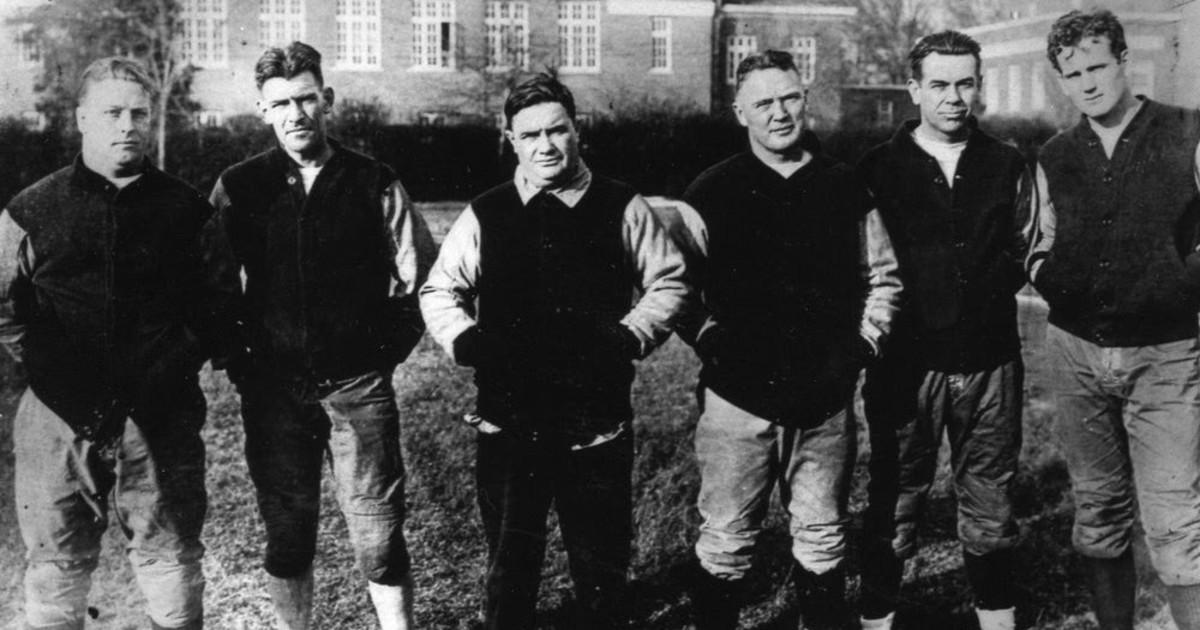Throwback Thursday: The Hardest and Coldest Words Alabama Coach Frank Thomas Ever Heard

When Wallace Wade turned in his resignation at the end of the 1929 season, there were two important immediate developments. The first was that he promised to fulfill the last year of his contract to the best of his ability, and Alabama went on to win the national championship.
The other was suggesting that former Georgia assistant coach Frank Thomas replace him. As a college quarterback, “Shrewd Tommy” had been George Gipp’s roommate at Notre Dame, and sportswriter Naylor Stone in “Coach Tommy of the Crimson Tide” credited Knute Rockne with telling his coaches: “It’s amazing the amount of football sense that Thomas kid has. He can’t miss becoming a great coach some day. I want him on our staff next fall.”
Instead, Thomas chose to attend law school.
According to the Atlanta Journal, Denny said when hiring him: “Now that you have accepted our position, I will give you the benefit of my views, based on many years of observation. It is my conviction that material is 90 percent, coaching 10 percent. I desire to further say that you will be provided with the 90 percent and that you will be held to strict accounting for delivering the remaining 10 percent.”
After leaving the meeting in Birmingham, Thomas said to writer Ed Camp: “Those were the hardest and coldest words I ever heard.”
But Thomas lived up to them, and was in Tuscaloosa well before Wade departed to help ease the transition
“Keep the players high and make practice a pleasure but not a lark,” he said. “Be a disciplinarian, but not a slave-driver.”
Even though 10 of the 11 starters from Wade’s final title team were gone and Rockne’s non-traditional “Box Formation” offense was installed, the Crimson Tide went on to average 36 points a game and post a 9-1 record that first season. It remains the best coaching debut in Alabama history.
Under Thomas’ direction, the Tide won the first Southeastern Conference championship in 1933, and national titles in 1934 and 1941. It was during the undefeated 1934 season, when Alabama outscored the opposition 316-45, that Tennessee coach General Robert Neyland made his famous comment: “You never know what a football player is made of until he plays against Alabama.”
With standouts like “Dixie” Howell, Don Hutson, Bill Lee, and a young end named Paul W. “Bear” Bryant, the Tide returned to the Rose Bowl, where it dominated Stanford, 29-13.
Alabama went back again at the end of the 1937 season to suffer its only loss in the Rose Bowl, 13-0 to California.
Despite having two losses in 1941, the Crimson Tide made its first postseason appearance other than the Rose Bowl, and created 12 interceptions to defeat Texas A&M in the Cotton Bowl, 29-21. Although Minnesota was the consensus No. 1, Alabama was able to claim a share of the title thanks to the Houlgate System (a mathematical rating syndicated in newspapers).
After having to scrap the 1943 season due to World War II, Thomas pieced together the famous “War Baby Tiders,” and in 1945 Alabama went undefeated, including a dominating 34-14 victory against Southern California in the Rose Bowl that prompted Trojans coach Jeff Cravath to say: “There goes a great man. I’ll never forget what he did today. If he wanted, he could have named the score.”
The Tide outscored opponents 430-80. However, it only resulted in a No. 2 ranking behind Army.
Due to failing health, Thomas stepped aside after the 1946 season with a record of 115-24-7. He resigned as athletic director in 1952, and died two years later, on May 10, 1954.

Some of this post originated from "100 Things Crimson tide Fans Should Know & Do Before They Die," published by Triumph Books
